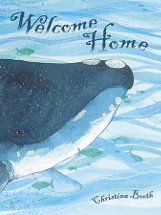Welcome home by Christina Booth

Ford Street, 2013. ISBN 9781925000092.
(Age: 3-6+) Once upon a time, although not that long ago, whaling
along Australia's shores was a thriving industry and vital to the
livelihoods and life of the communities at its centre. Whaling is
again becoming a thriving industry along Australia's shores, but
it's the marvelling at these awesome creatures, not the killing of
them that is its focus. How far we have come in just a handful of
generations.
In this beautifully, gently illustrated book by Christina Booth a
young boy hears the call of the whale 'echoing off the mountain like
a whisper while the moon danced on the waves'. Neither his parents
nor his grandparents could hear it - it was a sound for his ears
only. And each day he hears her call and learns something new about
the treacherous path her ancestors followed and the murderous intent
his ancestors had. Can there be a reconciliation between humans and
these magnificent creatures? Will she feel safe enough to show
herself as he waits under the night sky? Will a whispered 'Sorry'
give her courage?
The tone of this book is set in the dedication on the title page -
'We do not inherit the Earth from our ancestors; we borrow it from
our children.' (Chief Seattle) And it is one of the most sensitive,
beautifully told stories that I've had the pleasure to read for a
long time.
Although the setting is not identified, the story was inspired by
the birth, in August 2010, of a southern right calf in the Derwent
River, Hobart - the first in 190 years! While those who witnessed
this and the gradual return of the southern right (so-called because
they were the 'right' whale to hunt) to the Derwent and whisper,
'They are back', this story explores 'Where did they go?' Known in
the 19th century as a whale nursery, whalers hunted the southern
right almost to extinction but since 1935, when they became the
first species to be declared protected in either Australia or New
Zealand, the whales are slowly returning knowing that once again,
there is safe haven where only their photographs are taken, not
their lives.
Is the whale in the story, sighted in July 2013, the same one who
had the courage to give birth back in 2010? Only time will tell. But
for all those children who ask, 'Where did they go?', not just about
the southern rights but also all the other species that migrate
northwards and still inspire a sense of awe and wonder, this is a
perfect introduction to a past that is an integral part of
Australia's history and the foundation for an opportunity to build a
more glorious future. Fitting into the cross-curriculum priority of
sustainability perfectly, there is such scope for not only looking
at what happened and why, but also the changing perspectives of
humans towards their environment over time and what can be done and
achieved, as well as giving background to the questions and
arguments that arise when the Japanese begin their annual whale
hunt, or even looking at how science, particularly that emanating
from World War II, has produced viable alternatives. Riches indeed
to capture the passions of all.
Welcome Home is one of my top five books for teaching
children about treading lightly on this earth - it is not ours to
destroy.
Barbara Braxton